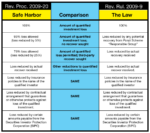FIRPTA Withholding Rate To Increase To 15 Percent
Effective February 16, 2016 FIRPTA general withholding rate increases from 10% to 15% effective for closings on or after February 16, 2016 in the United States. Closing agents should adjust their procedures and forms to reflect this change.
The 10% rate will still apply for those transactions in which the property is to be used by the Transferee as a residence, provided the amount realized (generally the sales price) does not exceed $1,000,000, and the existing $300,000 “exemption” remains unaffected. So here are your new guidelines:
- If the amount realized (generally the sales price) is $300,000 or less, and the property will be used by the Transferee as a residence (as provided for in the current regulations), no sums need to be withheld or remitted.
- If the amount realized exceeds $300,000 but does not exceed $1,000,000, and the property will be used by the Transferee as a residence (there are no regulations that specifically address these changes but many as assuming you can follow the current regulations for the $300,000 exception), then the withholding rate is 10% on the full amount realized.
- If the amount realized exceeds $1,000,000, then the withholding rate is 15% on the entire amount, regardless of use by the Transferee.
The well-documented flaws and risks of the $300,000 exemption will likely continue although future regulations could change existing procedures. The Transferee’s intent to use the property as a residence should be documented as best they can and point out to the Transferee the risks of allowing the exemption to apply to their transaction.
Under the law, the Transferee is the withholding agent and is responsible for withholding and remitting the proper amount to the I.RS. Taxpayers should also be alert for situations where the foreign Transferor forces the Transferee to claim residence status merely to lower the withholding rate, since the Transferee could be liable for any additional withholding tax, penalty, and interest if their intent is ever challenged by the IRS.
The current FAR/BAR contract form contains language specifically referring to a 10% withholding. An amendment to the contract for closing scheduled on or after February 16, 2016 should be added to change the potential rate of withholding to 15%.
Exception for interest held by foreign retirement and pension funds
The provision exempts from the tax rules governing Foreign Investors in U.S. real estate that are qualified foreign pension funds or by a foreign entity wholly-owned by a qualified foreign pension fund.
A qualified foreign pension fund means any trust, corporation, or other organization or arrangement
(A) which is created or organized under the law of a country other than the United States,
(B) which is established to provide retirement or pension benefits to participants or beneficiaries that are current or former employees (or persons designated by such employees) of one or more employers in consideration for services rendered,
(C) which does not have a single participant or beneficiary with a right to more than five percent of its assets or income,
(D) which is subject to government regulation and provides annual information reporting before its beneficiaries to the relevant tax authorities in the country in which it is established or operates, and (E) with respect to which, under the laws of the country in which it is established or operates.
Increase in rate of withholding of tax on dispositions of United States real property interests (sec. 324 of the bill and sec. 1445 of the Code)
Present Law
A purchaser of a USRPI from any person is obligated to withhold 10 percent of gross purchase price unless certain exceptions apply.
The Obligation does not apply if the transferor furnished an affidavit that the transferor is not a foreign person. Even absent such an affidavit, the obligation does not apply to the purchase of publicly traded stock. Also, the obligation does not apply to the purchase of stock of a nonpublicly trade domestic corporation, if the corporation furnishes the transferee with an affidavit stating the corporation is not and has not been a USRPHC during the applicable period (unless the transferee has actual knowledge or received a notification that the affidavit is false).
Explanation of Provision
The provision generally increases the rate of withholding of tax on dispositions and certain distributions of URSPIs, from 10 percent to 15 percent. There is an exception to this higher rate of withholding (retaining the 10 percent withholding rate is retained so long as the purchase prices does not exceed $1,000,000).
Persons and property subject to tax
Foreign persons are generally exempt from U.S. tax on capital gains.
Under FIRPTA, however, foreign persons are subject to tax on gains from disposition of U.S. real property interests (USRPIs).
An interest in property is any direct equity interest in the property, such as a fee simple ownership, but does not include interests solely as a creditor. Thus, co- owners of property each hold an interest in the property.
Real property is land, buildings and land improvements. Generally, whether property is or is not real property is determined under U.S. tax law concepts, not state law. Thus, gas pumps and awnings at gas stations are not real property under U.S. Federal tax law, even though they may be realty under state law. For FIRPTA purposes, real property also includes unsevered natural products of the land (e.g., oil and gas in place in the ground, uncut timber, unharvested crops) and personal property associated with the use of real property.
A United States Real Property Interest (USRPI) includes shares of a U.S. Real Property Holding Corporation (USRPHC). A USRPHC includes any U.S. corporation if more than 50% of such corporation’s assets were USRPIs at any testing date. Disposition of an interest in a USRPHC is subject to the FIRPTA tax and withholding but is not subject to state income tax.
This may be compared with the disposition of a USRPI owned directly, which is subject to the lower federal capital gains rate but is also subject to the state income tax.
Provisions generally do not apply, and gain must be recognized.
Amount of Gain
Under general U.S. tax principles applicable to FIRPTA, gain is equal to the excess of the amount of money or fair market value of property received over the amount of adjusted basis of the property exchanged. Where the amount received is subject to a contingency, the amount is not recognized until the contingency is resolved.
Tax Imposed
FIRPTA gain is subject to tax as effectively connected income. Nonresident alien individuals are subject to tax on such income at regular graduated tax rates for U.S. individuals. The deduction for personal exemptions, certain adjustments to gross income, and most itemized deductions are not allowed. Foreign corporations are subject to tax on such income at regular corporate income tax rates.
Withholding
Buyers of U.S. real property interests are required to withhold 10% of the full sales price on ANY purchase of a USRPI, subject to only four exceptions. Withholding is not required:
- By a purchaser for use as a residence for a price $300,000 or less.
- In a real estate corporate transaction, a myriad of persons may be involved as agents of either the transferor or the transferee. The list includes attorneys, accountants, brokers, transfer agents, settlement personnel, title companies, paralegals, secretaries, appraisers, lenders, and support staff for all such people.
- The regulations narrow the potential universe of agents considerably for purposes of the notice requirements.
General Rule
For purposes of these reporting rules, an agent of the transferor or transferee is a person who represents either the transferor or the transferee, either in negotiating the transaction with another person or in settling the transaction. In Section 1445 transactions involving a USRPI distribution by a foreign corporation; or a distribution of property by a domestic corporation, the term further includes
- Any person that represents or advises an entity or fiduciary with respect to the planning, arrangement, or consummation by the entity of the transaction; or
- Any persons that represents or advises the holder of an interest in an entity with respect to the planning, arrangement, or consummation by the entity of the transaction.
Settlement Officers and Clerical Personnel
Regardless of the above definition, a person is not an agent merely because such person performs one or more of the following activities:
- the receipt and disbursement of any portion of the consideration;
- the recording of a document;
- typing, copying and other clerical tasks;
- obtaining reports concerning title insurance and reports concerning the condition of the real property; or
- transmitting and delivering documents between the parties.
The “Net Election” General Overview
It is often difficult to determine whether the real estate rental activities of a foreign person are continuous, regular, and substantial enough to constitute the conducts of a U.S. trade or business.
If the foreign person is not engaged in a U.S. trade or business, it will generally be subject to the flat 30% withholding tax on its rental income.
However, if the rental activities rise to the level of a U.S. trade or business, the rental income will be taxed as effectively connected income on a net basis at graduated rates. This net basis taxation allows the taxpayer to deduct depreciation, real estate taxes and other expenses related to the real estate business from the gross rent to determine the net income subject to tax.
In most situations, this method of taxation will result in a lower current tax than the flat 30% tax. By making the “net election”, a foreign person can generally assure itself of a a U.S. trade or business status with regard to its U.S. real property activities regardless of whether the rental activities in fact constitute a trade or business under the general rules.
Eligibility to make the Election; Income to Which the Election Applies
A foreign corporation or a nonresident alien individual is eligible to make the election provided:
- The foreign corporation or the nonresident alien individual derives gross income during the taxable year from U.S. real property (or from an interest therein); and
- In the case of a nonresident alien individual, the property is held for the production of income.
As noted above, a key prerequisite to the making of the election is that the foreign person must derive gross income from U.S. real property (or an interest therein) in the year of the election. Once an election has properly been made, it remains in effect (unless revoked) in subsequent years even though there is no income from the real property in any subsequent year. Income from real property for this purpose includes gains from the sale or exchange of the real property, rents or royalties from mines, wells, or other natural deposits and gains. It also includes such amounts that are included in the gross income of a foreign person as a beneficiary of an estate or trust if the character of such income in the hands of the recipient is that of income from U.S. real property (or from an interest)
Exceptions from FIRPTA Withholding
- You (the transferee) acquire the property for use as a home and the amount realized (generally sales price) is not more than $300,000. You or a member of your family must have definite plans to reside at the property for at least 50% of the number of days the property is used by any person during each of the first two 12-month periods following the dater of transfer.
- When counting the number of days the property is used, do not count the days the property will be vacant.
- The property disposed of (other than certain dispositions of nonpublicly traded interests) is an interest in a domestic corporation if any class of stock of the corporation is regularly traded on an established securities market. However, if the class of stock had been held by a foreign person who beneficially owned more than 5% of the fair market value of that class at any time during the previous 5-year period, then that interest in a U.S. real property interest if the corporation qualifies as a United States Real Property Holding Corporation (USRPHC), an you must withhold on any disposition.
- The disposition is of an interest in a domestic corporation and that corporation furnishes you a certification stating, under penalties of perjury, that the interest is not a U.S. real property interest. Generally, the corporation can make this certification only if the corporation was not a USRPHC during the previous 5 years (or, if shorter, the period the interest was held by its present owner), or as of the date of disposition, the interest in the corporation is not a U.S. real property interest by reason of section 897(c)(1)(B) of the Internal Revenue Code.
- The certification must be dated not more than 30 days before the date of transfer.
- The transferor give you a certification stating, under penalties of perjury, that the transferor is not a foreign person and containing the transferor’s name, U.S. taxpayer identification number, and home address (or office address, in the case of an entity).
- You receive a withholding certificate form the Internal Revenue Service that excuses withholding. Refer to Withholding Certificates.
- The transferor gives you written notice that no recognition of any gain or loss on the transfer is required because of a Nonrecognition provision in the Internal Revenue Code or a provision in a U.S. tax treaty. You must file a copy of the notice by the 20th day after the date of transfer with the Internal Revenue Service Center, P.O. Box 409101, Ogden, UT 84409.
- The amount the transferor realizes on the transfer of a U.S. real property
interest is zero - The grantor realizes an amount on the grant or lapse of an option to acquire a U.S. real property interest. However, you must withhold on the sale, exchange or exercise of that option.
- The disposition (other than certain dispositions of nonpublicly traded interest) is of publicly traded partnerships or trusts. However, if an interest in a publicly traded partnership or trust was owned by a foreign person with a greater than 5% interest at any time during the previous 5 year period, then that interest in a U.S. real property interest if the partnership or trust would otherwise qualify as a USRPHC if it were a corporation, and you must withhold on it.






